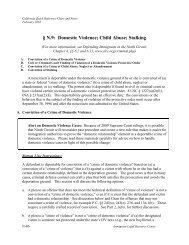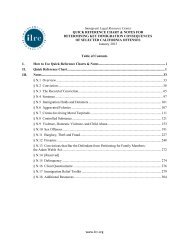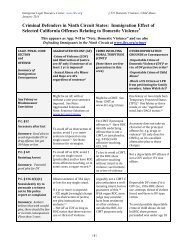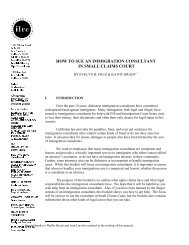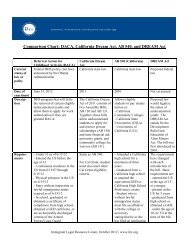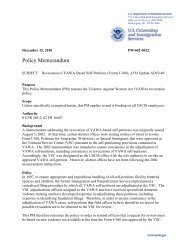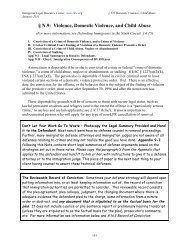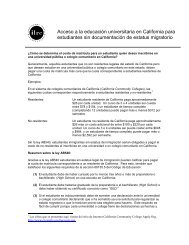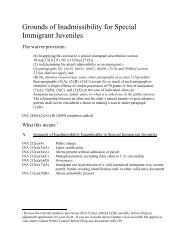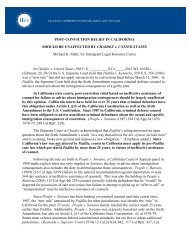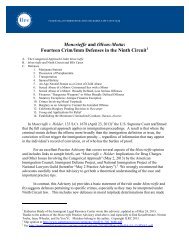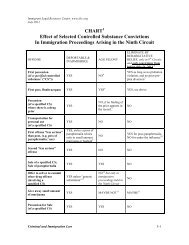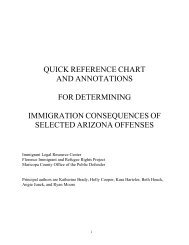quick reference chart and notes for determining immigration - ILRC
quick reference chart and notes for determining immigration - ILRC
quick reference chart and notes for determining immigration - ILRC
Create successful ePaper yourself
Turn your PDF publications into a flip-book with our unique Google optimized e-Paper software.
Cali<strong>for</strong>nia Quick Reference Chart <strong>and</strong> Notes<br />
February 2010<br />
• plead to an additional or substitute offense that does not become an aggravated felony<br />
due to sentence, <strong>and</strong> take the jail or even state prison time on that.<br />
Example: Felipe is a longtime permanent resident who is charged with multiple violent<br />
crimes. There are also allegations that a knife was used in the commission of the<br />
crimes. The prosecution is dem<strong>and</strong>ing that Felipe plead guilty to a strike <strong>and</strong> that he be<br />
sentenced to state prison. In this situation you may still be able to negotiate a plea<br />
bargain that avoids an aggravated felony conviction.<br />
First, identify an offense that will not become an aggravated felony even if a state prison<br />
sentence equal to or greater than 365 days is imposed. Here, P.C. § 12020(a)(1),<br />
possession of a deadly weapon, is not an aggravated felony even with such a sentence.<br />
The prosecution also is charging P.C. § 422, criminal threat, which will become an<br />
aggravated felony as a crime of violence if a sentence of a year or more is imposed. To<br />
avoid an aggravated felony, the court would have to designate § 12020(a)(1) as the base<br />
term <strong>and</strong> Felipe could be sentenced to the low, middle or high term. The punishment<br />
imposed pursuant to § 422 would have to be the subordinate term of one third the<br />
midterm, or eight months.<br />
• waive credit <strong>for</strong> time already served or prospective “good time” credits <strong>and</strong> persuade the<br />
judge to take this into consideration in imposing a shorter official sentence, that will<br />
result in the same amount of time actually incarcerated as under the originally proposed<br />
sentence (<strong>for</strong> example, waive credit <strong>for</strong> six months time served <strong>and</strong> bargain <strong>for</strong> an official<br />
sentence of nine months rather than 14 months);<br />
• rather than take a probation violation that adds time to the sentence <strong>for</strong> the original<br />
conviction, ask <strong>for</strong> a new conviction <strong>and</strong> take the time on the new count.<br />
B. Which Offenses Become an Aggravated Felony Based on One-Year Sentence?<br />
The following offenses are aggravated felonies if <strong>and</strong> only if a sentence to imprisonment of<br />
one year was imposed. Obtaining a sentence of 364 days or less will prevent an offense from<br />
being classed as an aggravated felony under these categories. 89 Counsel always should make<br />
sure the offense does not also come within a different aggravated felony category that does not<br />
require a sentence.<br />
• Crime of violence, defined under 18 USC § 16<br />
• Theft (including receipt of stolen property)<br />
• Burglary<br />
• Bribery of a witness<br />
• Commercial bribery<br />
89 See INA §101(a)(43), 8 USC § 1101(a)(43), subsections (F), (G), (P), (R), <strong>and</strong> (S).<br />
N-54 Immigrant Legal Resource Center



